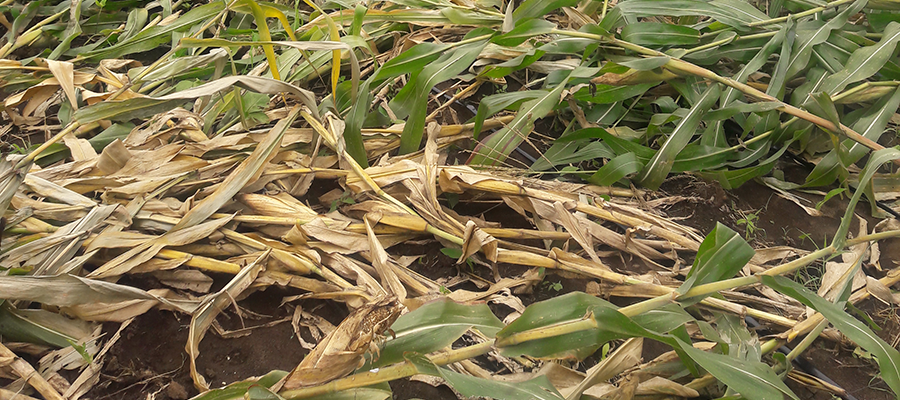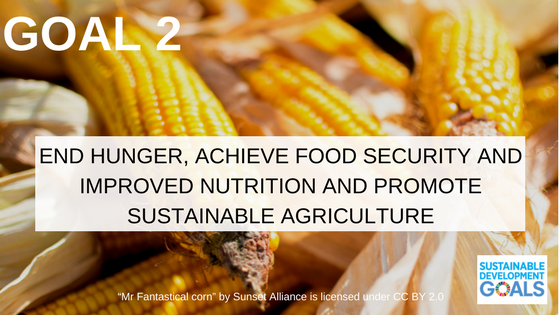With climate change creating more extreme weather and a growing world population, it is vital that we develop sustainable ways of improving the resilience and productivity of staple crops such as maize and rice. The University of Birmingham is helping to address this global challenge by working with the Biotechnology and Biological Sciences Research Council (BBSRC) and collaborators in the UK, China and Mexico to reduce lodging or flattening in maize and rice, which can dramatically reduce crop yields.
The challenge
The costs of lodging
Lodging in rice and maize is a major problem in Asia, and Central and South America. Lodging frequently limits crop yields, reduces resource use efficiency, and imposes significant (>$1500 million p.a.) economic costs low and middle income countries (LMICs).

Photo: CIMMYT
 Loss of productivity due to lodging isn’t simply a financial problem; it has real consequences for human wellbeing. Crop loss due to lodging is a barrier to sustainable development, particularly the United Nations’ Sustainable Development Goal 2:
Loss of productivity due to lodging isn’t simply a financial problem; it has real consequences for human wellbeing. Crop loss due to lodging is a barrier to sustainable development, particularly the United Nations’ Sustainable Development Goal 2:
“End hunger, achieve food security and improved nutrition and promote sustainable agriculture”
United Nations SDG 2
Meeting the needs of a growing and unpredictable world
The need to tackle crop loss due to lodging is made more urgent by the additional pressures created by a growing global population and climate change.
The latest United Nations (UN) research predicts roughly 83 million will be added to the world’s population every year between now and 2030, increasing the total global population from its current level of 7.6 billion to 8.6 billion, with further increases in the decades ahead. Improving the productivity of staple crops will be essential to meeting the demands of a growing global population.
At the same time as a growing global population is placing additional demands on food production, climate change is expected to negatively impact productivity. Climate change is expected to produce a greater frequency of extreme rainfall and wind events, which will increase the likelihood of productivity loss due to lodging in crops.
Our response
Researchers at the universities of Birmingham and Lancaster and the agricultural and environmental consultancy ADAS, together with the collaborators at the China Agricultural University (CAU) and Centro International de Mejoramiento de Maiz Y Trigo (CIMMYT) in Mexico, have joined together to develop new ways of reducing lodging in all major crops around the world.
China and Mexico have been selected because their climate is representative of larger areas of South East Asia and Central and South America climate. CAU and CIMMYT have close working relationships with a range of other countries. This means the insights and solutions generated by our research can be transferred to other countries which experience crop lodging.
The project will adopt a multi-disciplinary approach to problem-solving, involving wind engineers, crop scientists and extension experts in the UK, China and Mexico. This approach is unique and will provide solutions that could not be achieved without this sort of collaboration.
Research objectives
- To develop models of describing the lodging process for maize and rice
- To further develop the lodging model and test it in field conditions which are representative of commercial practices in the relevant countries
- To develop a framework for identifying regions, fields and part fields with the highest risk of lodging
- To apply the identification system to identify ways of reducing lodging risk
- To deliver a knowledge exchange programme between low and middle income countries (LMIC) and UK research groups to reduce the impact of crop lodging
Find out more
We will regularly report on the progress being made by the project and the impact our research is having on improving the resilience and productivity of staple crops.
A summary of the project can be viewed on the Gateway to Research Portal:
Understanding and reducing lodging in maize and rice
A technical overview of the modelling can be viewed here:
Technical overview of crop lodging model (PDF)
For more information about the project, please contact:
Professor Chris Baker
Professor of Environmental Fluid Mechanics
Email: c.j.baker@bham.ac.uk